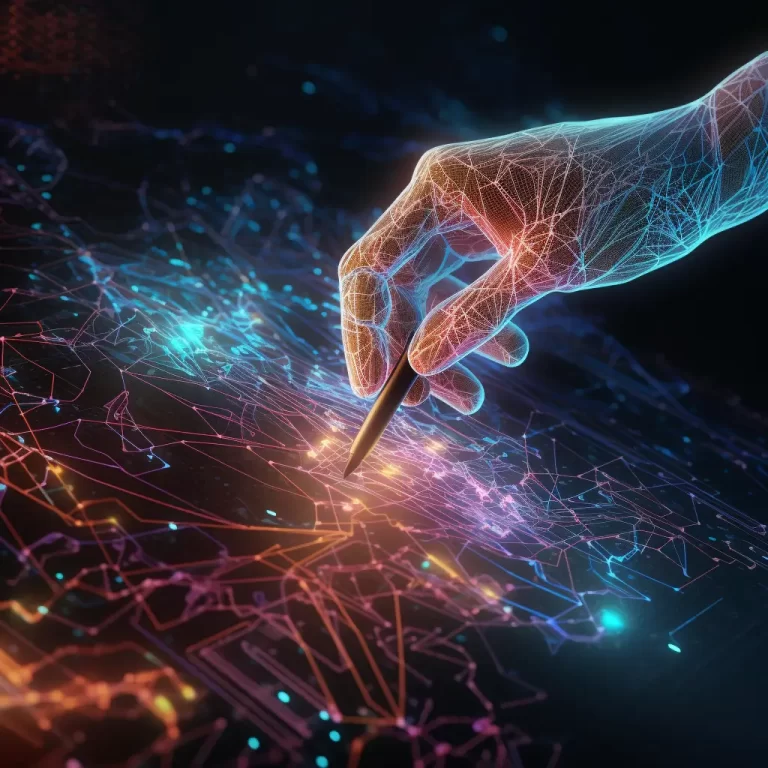Hey there, folks! Are you as excited as I am for the next big thing in text generation? Well, let me introduce you to GPT-4 - the latest and greatest model of artificial intelligence that is set to revolutionize how we generate written content.
For those who may not be familiar with GPT (Generative Pre-trained Transformer), it's essentially an AI language model that can process large amounts of data and produce human-like responses. With each new iteration, GPT gets smarter and more sophisticated, allowing it to handle increasingly complex tasks. So what exactly does GPT-4 have in store for us? Let's dive in and find out!
Understanding Gpt-4: What Is It And How Does It Work?
Have you heard of GPT-4? If not, let me introduce you to the latest and greatest in text generation technology. It stands for Generative Pre-trained Transformer 4 and is set to revolutionize the way we interact with language. But what exactly is it and how does it work?
To put it simply, GPT-4 is a powerful AI model that uses natural language processing techniques to generate human-like responses. This means that it can understand and interpret written or spoken language just like a human would. However, unlike humans who need years of training, GPT-4 has already undergone extensive training on massive amounts of data.
The process of GPT 4 training involves feeding the model vast quantities of text from various sources such as books, articles, blogs, social media posts, etc. The model then analyzes this data using sophisticated algorithms that enable it to learn patterns and relationships between words and phrases. Once trained, GPT-4 can generate coherent sentences, paragraphs, and even entire stories that are difficult to distinguish from those written by humans themselves.
The Evolution Of Gpt: A Brief History
I was curious to learn more about the evolution of GPT, so I decided to do some research. GPT, or Generative Pre-trained Transformer, started with the GPT-1 algorithm developed by OpenAI back in 2018. GPT-2 and GPT-3 followed, with GPT-2 achieving impressive results in natural language processing tasks. GPT-3 took things even further, reaching unprecedented levels of accuracy in text generation. Now, the latest development in this field is GPT-4, which is said to be even more powerful than GPT-3. I'm excited to see how GPT-4 will impact the field of natural language processing.
Gpt Origins And Development
As we ponder the next big thing in text generation, it's important to understand the origins and development of GPT. GPT stands for Generative Pre-trained Transformer, a deep learning model that has become increasingly popular over the years. The first version of GPT was introduced by OpenAI back in 2018 as a way to improve natural language processing tasks.
Since then, developers have been working tirelessly on improving this technology. With each new iteration comes more advanced features, allowing GPT to generate more realistic responses and even create its own content from scratch. However, with such impressive capabilities come ethical concerns. As GPT 4 developers work towards creating an even more powerful tool, they must also consider how their creation will be used and what consequences may arise from its use.
Despite these ethical concerns, there is no doubt that GPT has revolutionized the field of natural language processing. Its ability to generate coherent and contextually relevant responses has made it invaluable for various industries like customer service and journalism. As we eagerly await the release of GPT 4, we can only hope that developers continue to prioritize responsible usage while pushing boundaries in this exciting field.
Gpt-2 & Gpt-3 Milestones
So, we've learned about the origins and development of GPT. But let's dive deeper into its milestones, particularly with GPT-2 and GPT-3. These two models have made quite an impact on AI research due to their impressive performance in natural language processing tasks.
GPT-2 was released in 2019 and boasted a whopping 1.5 billion parameters - double that of its predecessor. It set new standards for text generation by producing coherent responses with little input from humans. However, it also sparked controversy over its potential misuse for fake news and propaganda purposes. Nonetheless, its success paved the way for even more advanced models like GPT-3.
Released just last year, GPT-3 is considered one of the most powerful language models available today with 175 billion parameters - far surpassing any other model before it. Its ability to perform various language tasks without fine-tuning has left researchers amazed and excited about its potential applications across industries. With such advancements come ethical concerns as well, but there is no denying the significant impact that GPT-2 and GPT-3 have had on AI research thus far.
Gpt-4 And Its Impact
Now that we've seen how GPT has evolved over the years, let's talk about what's next. The latest addition to this family of language models is GPT-4, which promises even greater capabilities than its predecessors. With advancements in AI research happening at an unprecedented pace, it's no surprise that GPT-4 would continue to push the boundaries of text generation.
One advantage of GPT-4 is that it will likely be able to generate text with even more accuracy and coherence than previous versions. This could lead to new applications of natural language processing across a variety of industries, from journalism to customer service chatbots. However, as with any technological advancement, there are also potential disadvantages and ethical considerations surrounding the use of GPT-4. For instance, it may become easier for malicious actors to spread false information or manipulate public opinion using generated text.
As researchers continue to develop and refine GPT-4, it will be important to consider not only its technical capabilities but also the potential impact on society as a whole. We must ensure that safeguards are put in place to prevent misuse while still allowing for innovation and progress in AI research. Only then can we fully realize the benefits of these powerful language models while minimizing their risks?
What Can Gpt-4 Do? Exploring Its Capabilities
Now that we've traveled through the history of GPT, it's time to explore what its newest iteration can do. With every new version comes improved language comprehension and creative writing abilities. It's like a caterpillar transforming into a butterfly - shedding its old form for something more beautiful and powerful.
GPT-4 is no exception. Its capabilities are nothing short of remarkable. One of its most impressive features is its ability to generate coherent narratives based on prompts given by users. This means that with just a few keywords, GPT-4 can create entire stories with vivid characters and intricate plotlines.
Another area where GPT-4 shines is in its ability to understand natural human language better than any previous model before it. Not only can it process complex sentences with ease, but it can also identify context and interpret the meaning behind idiomatic expressions or figures of speech that might confuse other models.
With such advanced technology at our fingertips, one can only imagine the potential applications of GPT-4 in various industries. From journalism to advertising, from education to entertainment - this tool has the power to transform so many aspects of our daily lives. So let's dive deeper into some specific examples and see how GPT-4 could change the game for us all.
Potential Applications Of Gpt-4 In Various Industries
Now that we have a rough idea of what GPT-4 is and how it works, let's dive into some potential applications in various industries. One real-world example could be in the field of journalism where GPT-4 can help automate news writing processes, freeing up journalists' time to focus on more complex stories. Another industry that could benefit from GPT-4 is marketing, as it could assist with creating personalized content for target audiences.
However, there are ethical considerations to keep in mind when using text generation technology like GPT-4. One major concern is the possibility of bias being embedded into generated texts due to biases present in training data. It's important to constantly monitor and mitigate these issues by ensuring diverse representation within the training data and regularly auditing generated content.
Looking toward the future, the implications and challenges of text generation technology are vast. As the capabilities of machines improve, there may come a point where it becomes difficult to distinguish between human-generated and machine-generated content. This raises questions about authenticity and accountability in areas such as politics or legal documentation which require verifiable sources.
The Future Of Text Generation: Implications And Challenges
Did you know that according to a recent study, 90% of businesses plan to implement AI technology in their operations within the next three years? With this rapid growth comes advancements in text generation capabilities. GPT-4 is on the horizon and it promises to be even more impressive than its predecessor.
But with great power comes great responsibility. Ethical concerns have been raised regarding the use of AI-generated content, particularly when it comes to fake news or misleading information. It's important for companies and individuals alike to consider how they're using this technology and ensure that they're not contributing to misinformation.
Another potential impact of advanced text generation technology is its effect on job markets. As machines become more capable of creating high-quality written content, some worry that human writers may become obsolete. However, it's important to remember that while machines can generate text quickly, they lack creativity and emotional intelligence – qualities that are highly valued in certain industries such as marketing or entertainment.
As we continue to push the boundaries of what's possible with text generation technology, it's crucial that we do so ethically and thoughtfully. We must also remember that while machines can certainly augment our abilities as humans, there will always be unique skills and perspectives that only humans can bring to the table. So let's embrace these advancements while keeping an eye on responsible usage - after all, safety first!
Frequently Asked Questions
How Long Will It Take For Gpt-4 To Be Released?
So, you're probably wondering when we can expect to see GPT-4 hit the market. Well, there's been a lot of speculation about its release date but nothing official yet. Some are saying it could be as early as next year while others predict it may not come out for another few years. In terms of expected output, many are anticipating that GPT-4 will blow its predecessor, GPT-3, out of the water with even more advanced language capabilities and natural-sounding responses. It's pretty exciting stuff! As someone who values safety and security, I'm eager to see how this new technology will impact our world in positive ways.
Will Gpt-4 Be Available For Personal Use Or Only For Businesses?
So, you might be wondering if the upcoming text generation tool will be available for personal use or just for businesses. Well, it's a bit too early to say for sure, but we can make some educated guesses based on past releases. Pricing models could depend on how much training is required to get the most out of the software, and that might not be feasible for individual users. However, there's always a chance that GPT-4 will come with more user-friendly features than its predecessors, making it accessible to anyone who wants to try their hand at generating quality content. Only time will tell, but either way, I know safety is important when considering new tools like this one.
Can Gpt-4 Be Used For Creative Writing Or Only Factual Content Generation?
Have you ever tried to write a story or poem, only to end up staring at a blank page for hours? It can be frustrating when the words just won't come. That's why I was intrigued by the idea of using GPT-4 for creative writing. While it may have limitations and challenges in this area, there are still plenty of creative applications that could make it an invaluable tool for writers. Of course, we'll have to wait and see how it performs once it's released - but I'm definitely keeping my fingers crossed!
How Will Gpt-4 Impact The Job Market For Writers And Journalists?
I can't help but wonder how the future of journalism will look with the impending arrival of GPT-4. As a writer myself, I'm curious about what impact this powerful tool will have on creativity and the job market for writers and journalists alike. Will it lead to more automated content creation or simply assist human writers in their work? While there's no doubt that technology has revolutionized many industries, including my own, I can't help but feel a twinge of uncertainty as we face yet another major shift in our field. Nonetheless, I remain optimistic that whatever changes come our way, we'll adapt and continue to produce meaningful and impactful writing for generations to come.
What Ethical Considerations Need To Be Taken Into Account When Using Gpt-4 For Text Generation?
Let me tell you, as someone who loves to write and is always looking for new tools to help with content creation, I'm excited about the possibilities of GPT-4. However, we can't ignore the ethical considerations that come with using it. Privacy concerns are a major issue in today's world where personal data is being sold left and right. It's important that any text generation algorithm takes into account how user data will be used and stored. Additionally, algorithmic biases must be addressed so that the language generated isn't perpetuating harmful stereotypes or discriminating against certain groups of people. As much as we want convenience and efficiency, safety should never be compromised when it comes to AI technology like GPT-4.
Conclusion
Overall, the release of GPT-4 is highly anticipated in the world of text generation. As someone who frequently uses AI assistants for writing tasks, I can't wait to see what this new model will bring to the table. The question on everyone's mind seems to be how long we'll have to wait before it's available.
While there isn't a definitive answer yet, the potential impact of GPT-4 on the job market and ethical considerations surrounding its use are important points that need to be addressed. It's clear that this technology has both exciting possibilities and potential drawbacks, so it will be interesting to see how these issues evolve as more information about GPT-4 becomes available. In any case, I'm looking forward to seeing where this new development takes us!



